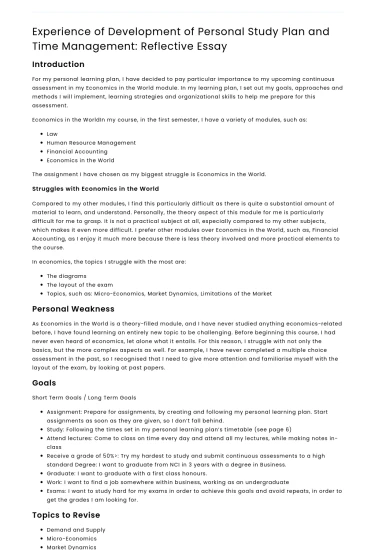Introduction
In the realm of academia, the ability to effectively manage one's time and develop a personalized study plan is crucial for success. As students navigate through the complexities of educational demands, a structured approach to learning becomes indispensable. According to Covey (1989), "The key is not to prioritize what's on your schedule, but to schedule your priorities." This notion underscores the importance of a personalized study plan which aligns with individual goals and learning styles. Furthermore, time management is a critical skill that enables students to allocate their resources efficiently, ensuring that they meet academic requirements while maintaining a balanced life. In this essay, we will delve into the methodologies of crafting a personal study plan, the significance of time management in learning, and address potential counterarguments to these strategies.
Crafting a Personalized Study Plan
Developing a personal study plan involves a systematic approach that begins with self-assessment. Students must first identify their learning objectives, strengths, and areas for improvement. This self-awareness forms the foundation of a tailored study strategy that caters to their unique needs. For instance, a study conducted by Zimmerman (2002) highlights the efficacy of self-regulated learning, where students who plan, monitor, and evaluate their learning processes tend to achieve higher academic outcomes. A well-structured study plan includes setting specific, measurable, achievable, relevant, and time-bound (SMART) goals, which provide clarity and direction.
Save your time!
We can take care of your essay
- Proper editing and formatting
- Free revision, title page, and bibliography
- Flexible prices and money-back guarantee
Moreover, incorporating a variety of study techniques catering to different learning styles—such as visual, auditory, and kinesthetic—can enhance the effectiveness of a study plan. A case in point is a student who excels in visual learning; incorporating charts and diagrams into their study routine can significantly improve their retention and understanding of complex concepts. Additionally, regular review and adjustment of the study plan are essential to accommodate changes in academic requirements or personal circumstances, thereby ensuring its continued relevance and effectiveness.
Transitioning from planning to execution, it is vital to integrate time management strategies to optimize the study plan's potential. These strategies ensure that the study plan is not only well-crafted but also practically implementable, thereby bridging the gap between planning and actual learning outcomes.
The Role of Time Management in Academic Success
Time management is a pivotal component in the execution of a study plan, as it involves the conscious allocation of time to various academic activities. Effective time management entails prioritizing tasks based on their urgency and importance, as suggested by the Eisenhower Matrix. This framework assists students in distinguishing between tasks that are crucial and those that are merely distractions, thus optimizing their productivity and focus.
Real-life examples demonstrate the profound impact of time management on academic performance. For instance, a study by Britton and Tesser (1991) found that students who practiced effective time management techniques, such as using planners and setting deadlines, consistently achieved higher grades than their counterparts who did not. Time management also encompasses the ability to say no to activities that do not align with one's academic goals, thereby preventing overcommitment and burnout.
Despite its advantages, some argue that rigid time management can lead to stress and stifle creativity. However, a flexible approach to time management, which allows for breaks and leisure activities, can mitigate these concerns. By scheduling time for relaxation and hobbies, students can maintain a balanced lifestyle, which is conducive to both mental well-being and academic success.
Conclusion
In conclusion, the development of a personalized study plan and the implementation of effective time management strategies are fundamental to achieving academic success. A well-designed study plan, tailored to individual learning preferences and objectives, provides a roadmap for academic achievement. Concurrently, time management serves as the mechanism through which this plan is executed, ensuring that students remain focused and productive. While counterarguments highlight potential drawbacks, a balanced and flexible approach addresses these concerns, ultimately fostering an environment where students can thrive academically. As academic demands continue to evolve, the ability to adapt and refine these strategies will remain a critical skill for students seeking to excel in their educational endeavors.






 Stuck on your essay?
Stuck on your essay?

